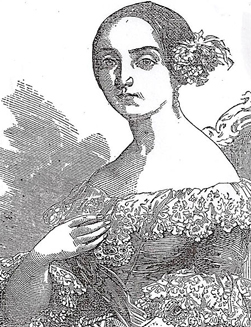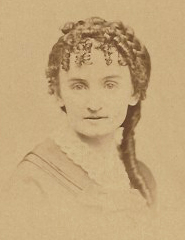“Someone sent me ‘Beauchampe,’” wrote Sallie McElroy in her journal on October 26, 1857. The anonymous gift she was referring to was a book by William Gilmore Simms—a reboot, actually, of his 1842 work Beauchampe; or the Kentucky Tragedy: A Tale of Passion.

The volume was a novelized version of a true story that began on November 7, 1825, with the fatal stabbing of a man in Frankfort, Kentucky. The victim, former state attorney general Solomon P. Sharp, had allegedly fathered a stillborn child whose mother, Ann Cook, was now living in seclusion near Bowling Green. Sharp, however, had not only denied paternity but had shockingly claimed that the child had been of mixed race. The disgraced Ann then fell in with Jeroboam O. Beauchamp, a young law student 15 years her junior, married him, and convinced him to kill Sharp to avenge her honor. Just before Beauchamp was to hang for the crime on July 7, 1826, he and Ann attempted a double suicide in the jailhouse, but only she succeeded. They were buried together in an “eternal embrace,” as they had requested.
Beauchampe was a rather unusual gift for 23-year-old Sallie, then teaching at a female academy in Bowling Green and boarding under the rather Puritanical eye of its headmistress. As Sallie knew, tradition demanded that women be shielded from such scandal lest it send them to the fainting couch, or worse, to a life corrupted by the taste of forbidden knowledge. One of her male friends, in fact, seems to have had her debating the wisdom of opening the book’s cover.

But she did not hesitate for long. Well-read, wryly observant, and Bible-literate enough to slice and dice the sermons of local clergymen, Sallie understood the double standard behind such male hand-wringing. “Yes, I will read it!” she wrote in her journal. “Men are extremely anxious to preserve us pure as saints—we must know nothing of the stream of pollution which ‘flows down our streets like a river’ for fear we shall be spattered a little by the spray as it dashes on in its headlong course!” True, there was the old saying, “Where ignorance is bliss, ‘tis folly to be wise,” but a “man wrote that,” she observed, “& I’m suspicious of the whole of ‘em! At least in this instance, I had rather have the wisdom than the bliss, as dear old mother Eve chose before me!”
So read she did, and emerged unscathed. Disappointed in the style of the book and its divergence from generally accepted versions of the incident, Sallie nevertheless found it “a most thrilling tale.” She was somewhat forgiving of Ann Cook—“a most extraordinary woman” who fell victim to “pride & ambition” and whose relatives still lived in the area. But Beauchamp was “a ninny of a fellow,” his reason captive to his passion. Sharp, too, was “a monster.” The bottom line, she concluded, was that “All three met only a just fate.”
Sallie McElroy’s journal is part of the Manuscripts & Folklife Archives of WKU’s Department of Library Special Collections. Click here for a finding aid, and here to read about a more recent book on the famous Beauchamp-Sharp Tragedy, written with the aid of our collections. For more collections, search TopSCHOLAR and KenCat.
